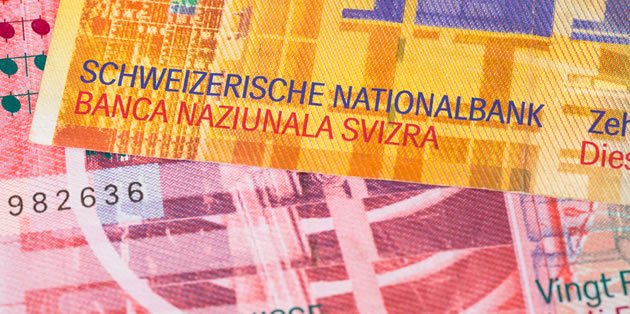The Euro to Swiss Franc (EUR/CHF) exchange rate declined by around -0.68% on Thursday morning.
Despite the fact that European economic data has produced mixed results, the single currency appreciated versus the majority of its most traded currency peers. This is due to continued positive sentiment after Greece managed to make an International Monetary Fund (IMF) payment despite expectations the troubled nation would default.
The Swiss Franc, meanwhile, strengthened even after domestic data showed foreign exchange reserves cooled. This suggests that the Swiss National Bank (SNB) refrained from buying in Euros in order to devalue the Franc.
The Euro to Swiss Franc (EUR/ZAR) exchange rate is currently trending in the region of 1.0318.
Euro (EUR) Exchange Rate Forecast to Climb versus the Majority of its most Traded Peers after Greece made IMF Payment
Given that most analysts expected Greece to default on its €200 million IMF repayment, the Euro continues to strengthen after the cash-strapped nation made the payment on time. However, with a much larger IMF payment due next week, the likelihood that they will make the payment without the provision of bailout funds is slim-to-none.
Thursday’s European economic data produced a mixed-bag of results, but it wasn’t enough to hamper single currency gains. German Factory Orders came in at 1.9% growth on the year, equalling the median market forecast figure. However, the German Construction PMI softened from 53.3 to 51.0. The Eurozone Retail PMI climbed from 48.6 to 49.5, but the German Retail PMI declined from 53 to 52.6.
Commenting on the German Construction PMI, Oliver Kolodseike, economist at Markit said; ‘Output growth in Germany’s construction sector slowed to only a marginal pace in April, with the headline PMI dropping to a three-month low. Housing and commercial activity increased at weaker rates, while work on civil engineering projects fell since the previous month. Despite the slowing in activity growth, there are some positive developments in April’s data. Panellists reported a further increase in new business, which some attributed to a low interest rate environment. Furthermore, companies continued to add to their payrolls and increase their buying activity, suggesting that output growth is likely to be maintained in coming months.’
The Euro to Swiss Franc (EUR/CHF) exchange rate has fallen to a low of 1.0300 today.
Swiss Franc (CHF) Exchange Rate Forecast to Advance Across the Board despite Cooler Foreign Currency Reserves
Swiss data produced relatively disappointing results on Thursday. SECO Consumer Confidence held at -6 in April, which bettered estimates of a drop to -11. Foreign Currency Reserves defied the median market forecast of a rise from 522.4 billion to 523.0 billion, with April’s result dropping to 521.9 billion.
The drop in foreign currency reserves has been received positively by traders, however. After the SNB opted to shed the Euro cap in January, the Franc appreciated significantly. The ‘Swissie’ (CHF) has since pared those gains amid speculation that the central bank would have to intervene in order to devalue the currency. The cooler foreign currency reserves, however, suggests that the institution has thus far refrained from intervention. ’This means mostly that the bank has not intervened massively to weaken the currency in the last month,’ IG Bank analyst Laurent Bakhtiari wrote in a note.
Euro to Swiss Franc (EUR/CHF) Exchange Rate Forecast to Maintain Losses amid a Lack of Data to Curb the Trend
Given the absence of domestic data to provoke changes, and with the ‘Swissie’ holding a significant advance over the common currency, the Euro to Swiss Franc (EUR/CHF) exchange rate is likely to hold losses for the remainder of Thursday’s European session.
Friday could see greater EUR/CHF volatility with several influential economic data results pertaining to both Europe and Switzerland.
The Euro to Swiss Franc (EUR/CHF) exchange rate reached a high of 1.0403 today.



